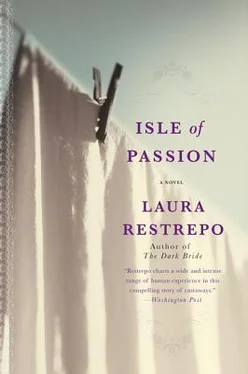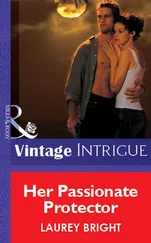“Look, Mom! Look at all the bats!”
“Come here, Mom, the toads are so ugly!”
“Mom! Help me catch one, Mom.”
Alicia suddenly realized that her children were happy. Many times before, she had watched them behaving in the same way, saying the same things, playing in the same manner, but she had not realized that. Now she saw it clearly: that all her years of tragedy were for them just everyday life. They had nothing to compare it with; they missed nothing. Like other times before, she convinced herself that she should go down the cliff, walk back home, and forget about demented solutions. How was she going to kill her own children, when neither hunger nor Victoriano had yet been able to? It made no sense. It was absurd. Horrible. She was not going to do that. She wouldn’t do it for anything in the world. Her pain diminished, allowing her to breathe again. An unexpected joy of life came over her, and to see the children alive, alive in spite of everything, made her happy.
She almost told them, like often before, “Let’s go back home, children, our excursion is over.” But she remembered the three years they had been abandoned on the isle without hope. They would be in the same situation after three more years, and in three more, six; and three more, nine, and three more, twelve, and three more, fifteen. The words died in her throat. It was better to jump and be done with it.
Over and over she made up her mind, got close to the abyss, looked at the children, and changed her mind, anguishing in her doubts. Her heart could not take it any longer. The sun had not reached high noon yet, and there was still a layer of green mist over the ocean.
Behind the fog, on the horizon, Alicia saw a radiance. Points of light were moving, shining. They twinkled, died down, they reappeared suddenly, to disappear again as quickly. She remembered watching the sky as a child in Orizaba when sometimes she had been able to see, very high and far away, the fireworks celebrating a neighboring town’s patron saint. But now the lights were low, at water level.
“The last thing I need,” she said. “A ghost ship.”
She felt light-headed, and shivers went down her spine.
“Oh, Ramón, don’t do this to me. Don’t send me mirages also; we had to pay so dearly for yours.”
She rubbed her eyes, bit her lips, but the brilliant points of light were still there. They were compacting, becoming a solid mass.
“Please, Ramón, don’t make fun of me, not now. Take away this vision and give me strength to jump, before the suffering makes me hesitate again.”
The children, lost in their world, were making a lot of noise, holding on to her legs, pulling her to and fro. As usual, they wanted to go into that hole inside the rock, catch a toad, or wanted to know if it was true that bats could smoke. She remained mute, motionless, and stunned, without being able to free herself from her hallucination. A big gray thing was advancing toward the isle, cutting through the waves and dispersing the fog.
“Ramoncito!” she summoned her son. “Come here. Tell me, what do you see over there? But don’t lie to me, don’t pretend. Just tell me what you see.”
“It’s a ship, Mom.”
There it was, facing them, in the water. Metallic and solid, identical to the one she had seen reflected in her husband’s eyes before he died.
“Make some signals, son,” Alicia ventured in a weak, brittle voice.
The boy waved his arms. Alicia did not dare to, she did not want to fall into that trap. Her body was paralyzed, but her heart was racing. She would not make any signals. She would not shout at a ghost to ask for help. It was all a dream, and she was bound to wake up. Since everything was lost, at least she would keep her composure, her reason. She remembered her own dictum: only what one can touch exists. That ship was intangible; it did not exist. Ramoncito was screaming: “Here, we are heeeere!”
The two girls came to see what was going on, and they went crazy when they saw the ship. Ramón took off the piece of material he was wearing as a loincloth, and waved it over his head. The girls soon imitated him. They let themselves be carried away by their enthusiasm. They were running in every direction, yelling for help, waving their rags as if possessed.
“Help!” Alicia heard herself shout, to her surprise.
This first shout was like a door opening in her throat, letting out all the hopes she had held back, after so many years of stifling them, of not giving them wings. Now she, too, was running, screaming, laughing, and praying, kissing her children.
“This is the real thing, Ramón. This is really it!” she repeated, looking upward, more in an effort to convince herself than to inform her husband.
The ship was closer now, and she could see the flag: it was the U.S. flag. A sharp panic stunned her: What if nobody on board saw them and the ship went back? It was not a Mexican ship, and therefore it would probably just cruise by. Unless they could manage to make it stop.
“Let’s yell loud and clear, so they hear us!” she told the children, and she herself put her whole soul into each yell.
In the furor of all the clamor, Alicia tore off the saintly bedsheet she had wrapped around herself. Naked like her children, with Angel on her back, and brimming with the joy of her renewed desire to live, she waved the white sheet in the air.
“You rag, better be good for something,” she commanded. “Make them see us!”
High Seas, Aboard the Gunboat Yorktown, 1916

IT WAS STILL AS DARK AS night at six fifteen on Wednesday, 18 July when Captain H. P. Perril came to the bridge. He was hit by a milky curtain that, at first, he could not decipher as fog or as the nebulae in his still-sleepy brain. Nobody on board the Yorktown had been able to sleep due to the choppy seas and the extreme heat. A few of the men had tried to sleep on deck, until various scattered but recurrent rainstorms forced them to go back in. At four o’clock, even the captain had managed some light sleep, which had just become deep sleep by the time he was awakened, as usual, at six.
Slowly he began to connect with the real world: a strong wind was blowing from the southwest, and an impatient sea jolted the ship without mercy or rhythm. He asked the helmsman if he could see anything, and he answered, “Only the fog, sir.” There was no visibility until nine fifty, when the lookout shouted that he had sighted land.
“That boy has an eagle eye,” commented Perril, uselessly trying to see it.
Not until fifteen minutes later was he able to see a gray shadow in the distance. As they got closer, the shadow darkened and took first the tall aspect of a ship’s sails, and later that of a castle. It was Clipperton, no doubt. It was the big rock on the southeast coast, according to description. Captain Perril felt uneasy. Neither he nor his men had entertained any desire to sail there. Before they left San Francisco, however, Admiral Fullam, commander in chief of the U.S. Pacific Fleet, had informed them that Clipperton was to be included in their itinerary. They were in the middle of the world war and there were rumors that the Germans, taking advantage of the tense relationship between the Mexican and U.S. governments, had installed radio stations or submarine bases along the Pacific coast of Mexico. The gunboat Yorktown had to engage in a meticulous surveillance trip.
It was a monotonous, routine job, and his crew was anxious to be in action, so he received the news reluctantly. Before the gunboat parted from the continent, they had determined their ports of call carefully. Admiral Fullam had placed the quadrant on top of the map and traced an appropriate itinerary from Honolulu to Panama. Clipperton was just underneath the black line.
Читать дальше













